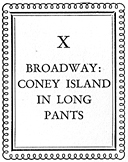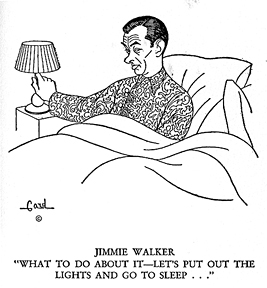In Chapter 10 of In Your Hat, the 1933 tell-all memoir by Hat Check Girl to the Stars Renee Carroll, she shares tales of the various scams, cons, and rackets one was likely to encounter along Broadway back in the day and the characters behind them, including Harry, the Rose Seller, Dick the Bicyclist, and Angelo, the Newsboy.

KNOWING Owney Madden and Rothstein and thinking of them as racketeers of a higher order makes it just a little bit difficult to train your telescope down the line and pick up such characters as “Harry, the Rose Seller,” “Dick the Bicyclist,” “Angelo, the Newsboy” and the others who infest Times Square with petty rackets.
Still, for sheer ingenuity, Faginesque cunning with any of the harder criminal tendencies, these petty workers of the Main Stem take some kind of cake—and it’s probably sponge.
Because I know Broadway so well, from the tallest to the shortest, I’m also personally acquainted with the petty rackets, but maybe I’m exaggerating when I say petty, because if fifty dollars a night as wages is petty, then I’m Clara Bow and Rin Tin Tin was my favorite nephew.
I got to know Dick, who owns a bicycle and wants everybody to know it, because I used to pass him every night on his beat. After a while he came to know me, too, and would stop me and exchange stories, which was quite harmless.
Dick’s right name is Abie Marcovitch and he was born down on Allen Street. He was one of those kids who get wanderlust at the age of sixteen. So one day, bidding his father a penciled note of a good-by, he bought himself a bicycle with the money he had saved from his Saturday job and pedaled away towards New Jersey.
When he came to Harrison he got discouraged (who wouldn’t?) and decided that the great Wets would probably remain so, without any part of him. So he turned around and started to wheel home. But a few miles later he conceived a brilliant scheme. He was going into the petty racketeering business!
He stopped off in Jersey City and began to carry out his plan. First, he traded in his new bike for a second-hand one. It was a sturdy but dilapidated affair that had seen service on the velodrome floor. Then he visited an old bookstore that carried a sideline of curiosities. Here he selected a collection of used postal cards showing the sights of various countries of the world. The postal cards he pasted on a triangular cardboard which he has mounted within a frame and attached to the rear of his bicycle.
Then he bought a second hand aviator’s helmet, a pair of goggles, a windbreaker and a pair of puttees. These he splashed liberally with mud. Later he purchased a knapsack and filled it with a few essentials including a towel and soap.
With this equipment he proceeded on his interrupted journey into New York. Oh, I forgot,—in red ink he wrote across the postcards of his prowess as a wheelman. “New York to San Francisco in Fifteen Days”, “Paris to Rome”, “Moscow to Vienna”, and other phony inscriptions.
When he came to Times Square, he parked his wheel with a friend until nightfall and then went about his plan. He had it figured out that people are gayest at the time that the theater is over, for then the carefree usually start out on their merry-go-round of the evening.
Well, he parked up on Broadway somewhere, just outside the very busy zone but still in the theater district. All he did was stand his wheel at the curb and lean against it. He was a curious sight for Broadway. Spattered with mud and dust, his wheel was obviously the veteran of thousands of miles, his postcards testifying to his integrity. In five minutes a sympathetic crowd had gathered. Some read the postcards or the messages he had scribbled across them from the mayors of the towns he supposedly had visited. Some asked him questions which he answered glibly.
The racket, as he went on to explain to anybody he could buttonhole, was that he was trying to get to Japan and anything they could help him with would be like manna. After the first night’s work, some two hours of standing and talking, little Abie discovered that he had collected almost $25 for his pains. People were very generous and interested. To some he told stories of hardship and privation encountered in his fake travels; other learned of his proposed jaunt to the Orient—and everybody helped.
It seems that most people have a feeling that they’d like to travel and if they find they can’t but are able to help somebody else to do what they’d like to do by donating a dime or a quarter, more than likely they’ll come across. Besides, Abie was a quick talker, and knew whom to talk to longest.
This kept up for about a week, at the end of which time he discovered tat he was a rich man indeed. During that first seven days he had collected $225, more than he had earned in his whole life and more than his father could earn in two months. Unlike other kids of his age he kept quiet about it, stuck his money in a bank, and kept on riding his wheel up to Times Square every night.
After people got to know him they took him more or less as a joke. But figure out for yourself how much $200 a week is for a year and it’s no joke.
Abie kept it up for about fourteen months. He had to be careful. He was getting too well known to the cops and his spiel to the people about getting off to Japan on the next day was a little worn when the same people who slipped him a couple of dollars on more than one occasion came back to ask about it.
Finally, he rode off one night and I haven’t seen him since. As far as I can remember he worked that racket for about $10,000. I’m not sure but I think I saw him once after that on Broadway. He was dressed up in fine clothes and was escorting a nice Jewish girl. I said hello but he gave me a cold stare that froze my appendix to the spot, and the girl looked at him very suspiciously. If it’s his wife I hope he doesn’t try any petty rackets with her. She didn’t seem the type.

